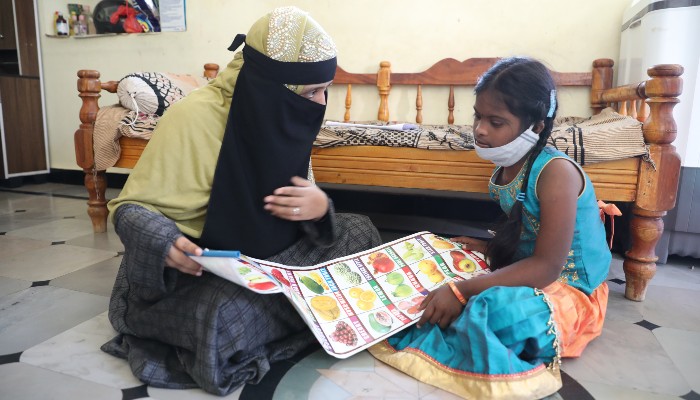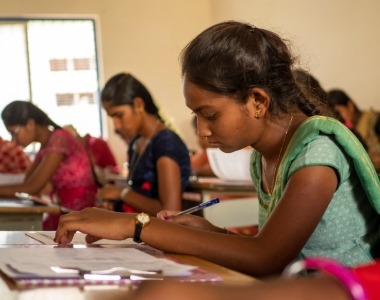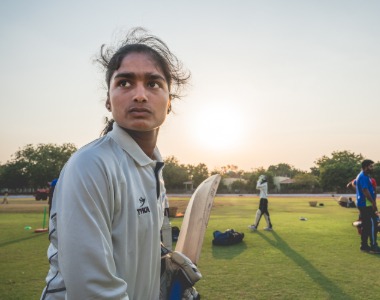My name is Kairevu Mehataz. I am part of a team of 59 teachers who provide therapy and rehabilitation to around 2,800 children with varying disabilities in 57 mandals of Ananthapur district.
Since March 2019 I have been working at RDT Centre for Children with Cerebral Palsy at Kanekal. RDT runs three such centres and five centres for children with Intellectual Disabilities – all residential – to provide therapy and rehabilitation to children from the age of 6 to 18 years to reduce the severity of their disabilities and help them achieve partial or full independence.
When the lockdown was imposed at the beginning of the COVID-19 pandemic in India, all these centres were closed and the children left for their homes. This abrupt break would possibly result in a loss of progress that we, as therapists, have made with the children. This is why when the lockdown restrictions were lifted, RDT decided to organise home therapy sessions for these children.

We have all heard of children covering long distances to school but here teachers and therapists of these RDT centres, like me, are travelling to the houses of our students to provide therapy services. We work along with the parents to teach therapy exercises and learning activities which the children need according to their disability. We have four co-ordinators specialising in therapy and intervention who follow-up with these cases and conduct orientation sessions to improve our knowledge and skills.
I am in-charge of providing these services to 89 children in 34 villages of Kalyandurg mandal. These children vary in disabilities like cerebral palsy, delayed developmental disorders, and intellectual disabilities. Today I am going to introduce you to some of my students and give you an insight of my work and the life of my students.
1. Lahari
Lahari was born with Down syndrome. Her father, Naga Bhushana, is an employee at a bank and her mother, Dhana Lakshmi, is a homemaker. Lahari’s father told me that when she was 6 years old they started visiting RDT’s early intervention camp, two times weekly.

Currently Lahari studies at one of the RDT Centre for Intellectual Disability. The family shifted from Kalyandurg to Bukkarayasamudram so Lahari could live with them while receiving therapy and education.
I love visiting Lahari as she is a lively child. She loves coloring and arts, which is why I make sure to include it as a part of the activities that we do together. I also teach her basic concepts like alphabets, numbers, picture identification, etc.,

“After enrolling her in the RDT ID Centre, we have seen a huge improvement. She recites the alphabets, numbers, can identify colours, birds and animals and is able to do her daily chores. We are very happy to see her progress,” explains Lahari’s mother with a smile.
2. Arun Tej
This is another student, Arun Tej, who has autism. He was enrolled in the Centre for Children with Cerebral Palsy in 2019 and came home when the centre was closed due to the pandemic. He has two younger siblings. Arun’s parents are agricultural labourers and the family leads a difficult life. But even with their limited resources, they try the best to provide for them.
When I visit him, I teach him things like identifying basic household items and performing activities of daily living like eating food, brushing teeth, etc. We also stimulate his sense of touch by introducing him to different textures which he finds relaxing.

Arun is quite close to his parents and loves to spend with his mother. Since his therapy began he tries to brush and eat by himself. He has learnt to maintain eye contact. We are also trying to work on his hyperactive behavior which is usually triggered in unfamiliar surroundings.
3. Manisha
This is Manisha. She has intellectual disability. Prior to the lockdown, she was living at the Centre for Children with Intellectual Disabilities. Her father is an attender at a government school and her mother is a homemaker.
Manisha feels triggered with loud sounds or unsual activities which is why the children in the village do not include her in their games. So she usually plays with her brother. She also helps her mother in household chores and her family loves to engage and play with her.
“Since living in the centre, she has shown a great deal of improvement, especially when it comes to understanding language, daily activities”, explains Manisha’s mother.

While visiting Manisha, I create fun ways for her to learn alphabets and numbers. We also do drawing and colouring activities. Manisha is a curious child who pays attention to her surroundings and people around her and wants to interact with them.
This is my role in the life of my students and their families. The work I do is surely not easy. It is challenging and even frustrating at times. But it has made me realise that lending one hand of support can change lives, and that thought motivates me to do what I do, every day.
Text: Felita Viegas


 April 19, 2021
April 19, 2021  rdt
rdt  Related Post
Related Post




